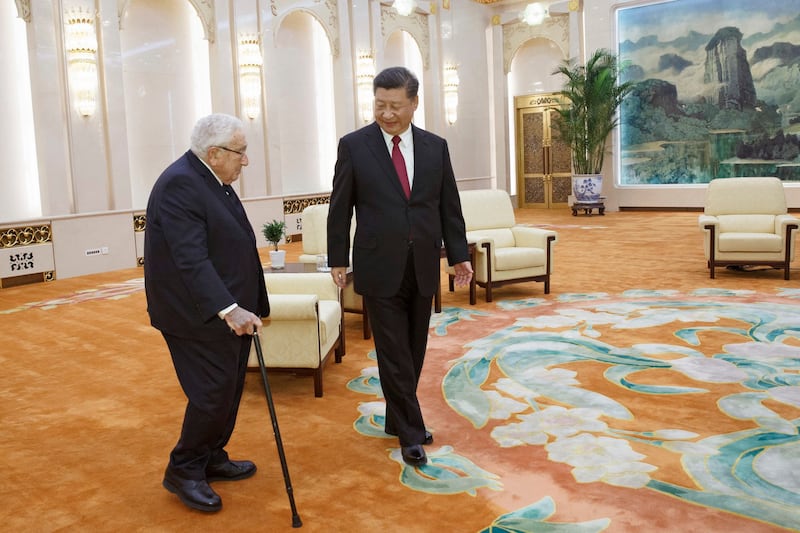Updated Nov. 30, 2023, 03:05 p.m. ET.
Henry Kissinger, a veteran strategist who wielded major influence on U.S. foreign policy for decades after he served as top diplomat under President Richard Nixon, died Wednesday at the age of 100, his consulting firm said.
At the height of the Cold War, Kissinger engineered Nixon’s early 1970s U.S. diplomatic opening with China, and played a pivotal role in the American withdrawal from Vietnam – deploying a massive bombing campaign in Cambodia and Laos that critics say amounted to war crimes.
Kissinger advised at least 10 U.S. presidents on foreign policy, and met every Chinese leader from Mao Zedong to Xi Jinping. He remained active in world affairs throughout his life, meeting in July in Beijing with Xi, who on Thursday called him "a world-renowned strategist, and a good old friend of the Chinese people.”
"Half a century ago, he made a historic contribution to the normalization of China-U.S. relations with brilliant strategic vision, benefiting both countries as well as changing the world,” Xi said in a statement carried by Chinese state television.

U.S. Secretary of State Antony Blinken said Kissinger “made countless history-bending decisions” during his time in office.
“To serve as America’s chief diplomat today is to move through a world that bears Henry’s lasting imprint – from the relationships he forged, to the tools he pioneered, to the architecture he built,” Blinken said in a statement.
Kissinger won the Nobel Peace Prize in 1973 – jointly with North Vietnamese counterpart Le Duc Tho, who refused the award – for negotiating the Paris Peace Accords with North Vietnam that ended U.S. involvement in the Vietnam War.
He was also condemned as a war criminal by his detractors, partly due to the 1969-73 U.S. secret war with Cambodia and the bombing of Laos.
Cold War imperatives
Kissinger's “Operation Menu” -- a carpet-bombing campaign to disrupt communist North Vietnamese operations and supply lines -- killed an estimated hundreds of thousands of people and contributed to the rise of the murderous Khmer Rouge regime, Cambodian-American scholar Sophal Ear wrote.
"The devastating impact of Kissinger's policies in Cambodia cannot be overstated – they contributed to the unraveling of the country's social fabric and the suffering of its people, leaving behind a legacy of trauma," he wrote in The Conversation, an on-line journal.
He was widely criticized for his support for unsavory dictators that served U.S. interests during the Cold War .
In Latin America, he helped orchestrate the toppling of Chile's democratically elected president, Salvador Allende. He was accused of the greenlighting Indonesia's seizure of former Portuguese colony East Timor and backing Pakistan despite its campaign of killings and mass rape in East Pakistan, which won independence as Bangladesh.
Bangladesh Foreign Minister AK Abdul Momen was quoted by Indian media as recognizing Kissinger as an "iconic diplomat (who) played an immense role in the diplomatic world" but condemning his support for the Pakistani military regime in the 1971 war.
"We feel that he should have apologised to the people of Bangladesh for what he has done — the genocide, mass killing of the people of then East Pakistan," Momen was quoted by the Indian media outlet WION.
As secretary of state under Nixon, Kissinger led arms control talks and efforts at detente with the Soviet Union, and improved relations between Israel and some of its Arab neighbors through intensive "shuttle diplomacy."
Serving under Nixon during the Watergate scandal, Kissinger emerged relatively unscathed and continued in his role as secretary of state under Gerald Ford, although he was stripped of his role as national security advisor.
‘Old friend’ of China
When Ford lost to Jimmy Carter in 1976, Kissinger left government to set up a consulting firm, advising corporate leaders, writing books and appearing regularly in the media.
“The world has lost a tireless advocate for peace,” Winston Lord, a former U.S. ambassador to China and Kissinger’s former special assistant at the National Security Council, told Reuters.
“America has lost a towering champion for the national interest,” he said.
“During more than seven decades, he transformed America’s role in the world, held the nation together during a constitutional crisis, crafted visionary volumes, counseled world leaders, and enriched the national and international discourse,” added Lord
Kissinger visited China more than 100 times. Chinese foreign ministry spokesperson Wang Wenbin described him as an “old and good friend of the Chinese people,” saying that Kissinger believed China-U.S. relations were “vital to the peace and prosperity of the two countries and the world."
State broadcaster CCTV hailed his "historic contribution to the opening of the door to US-China relations," AFP reported.
It called Kissinger "an important witness who experienced the establishment of diplomatic relations between China and the United States and the development of the relationship between the two countries".
Russian President Vladimir Putin paid tribute to Kissinger’s “pragmatic foreign policy. He said it “paved the way for a detente in international tensions and made it possible to reach the most important Soviet-American agreements that contributed to strengthening global security," according to a statement released by the Kremlin.
Born Heinz Alfred Kissinger in Germany in 1923, Kissinger moved to the U.S. in 1938, escaping the Nazi holocaust.
He became an American citizen in 1943 and served in the U.S. army in World War Two.
He was married twice, to Ann Fleischer with whom he had two children, and then Nancy Maginnes.
Edited by Taejun Kang, Elaine Chan and Paul Eckert.
Updated to add details and comments by U.S. and Bangladesh officials and a Cambodian academic.

